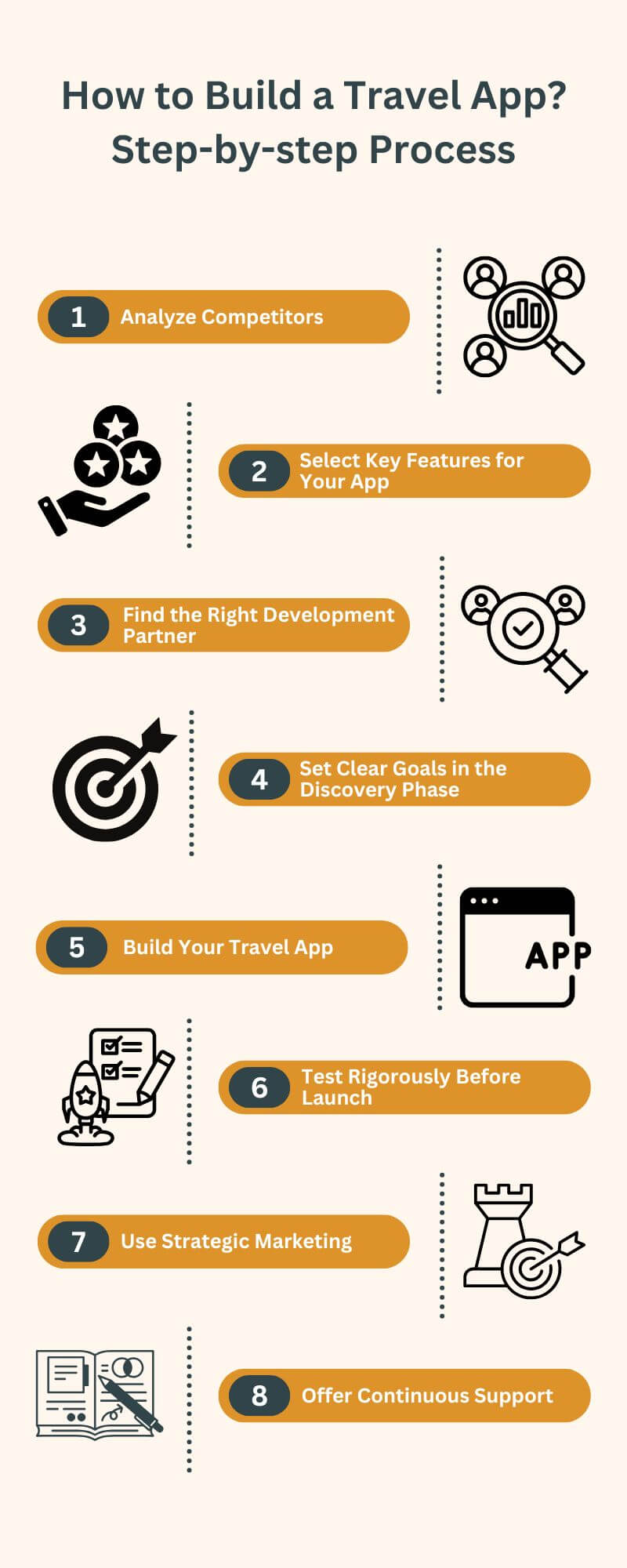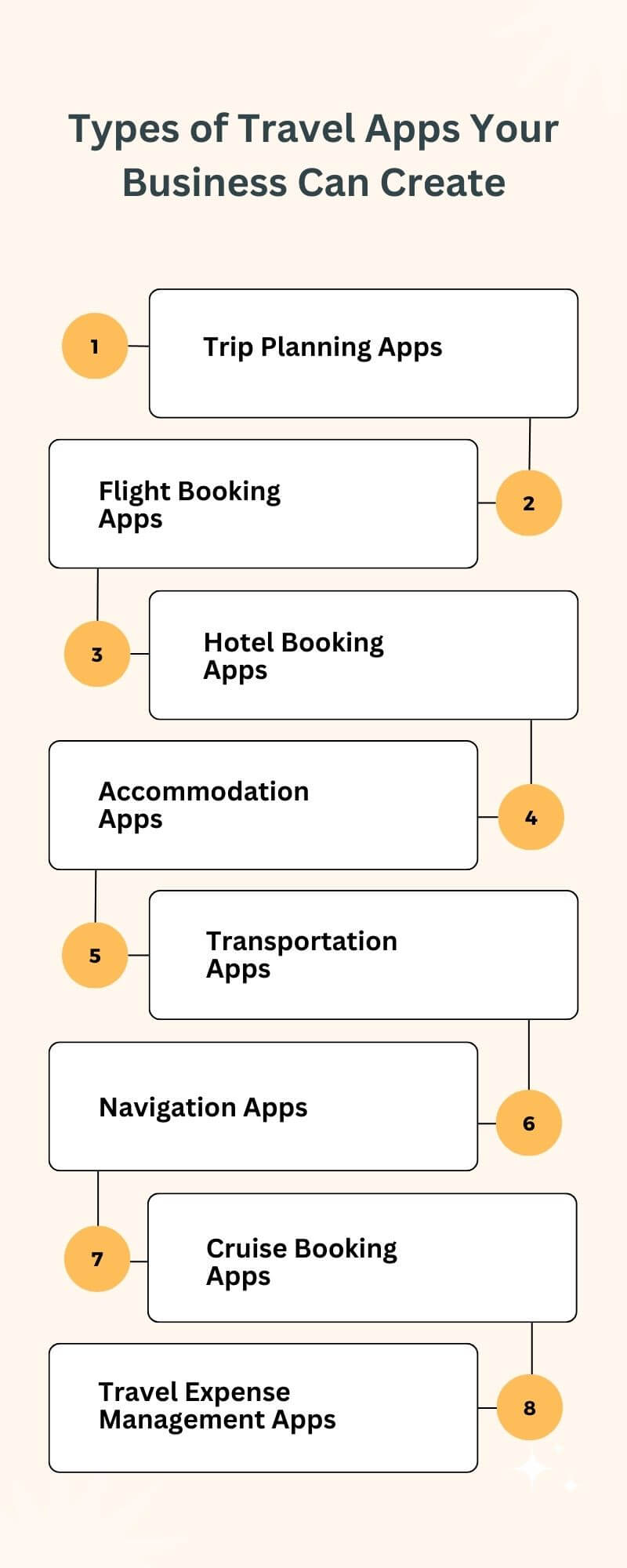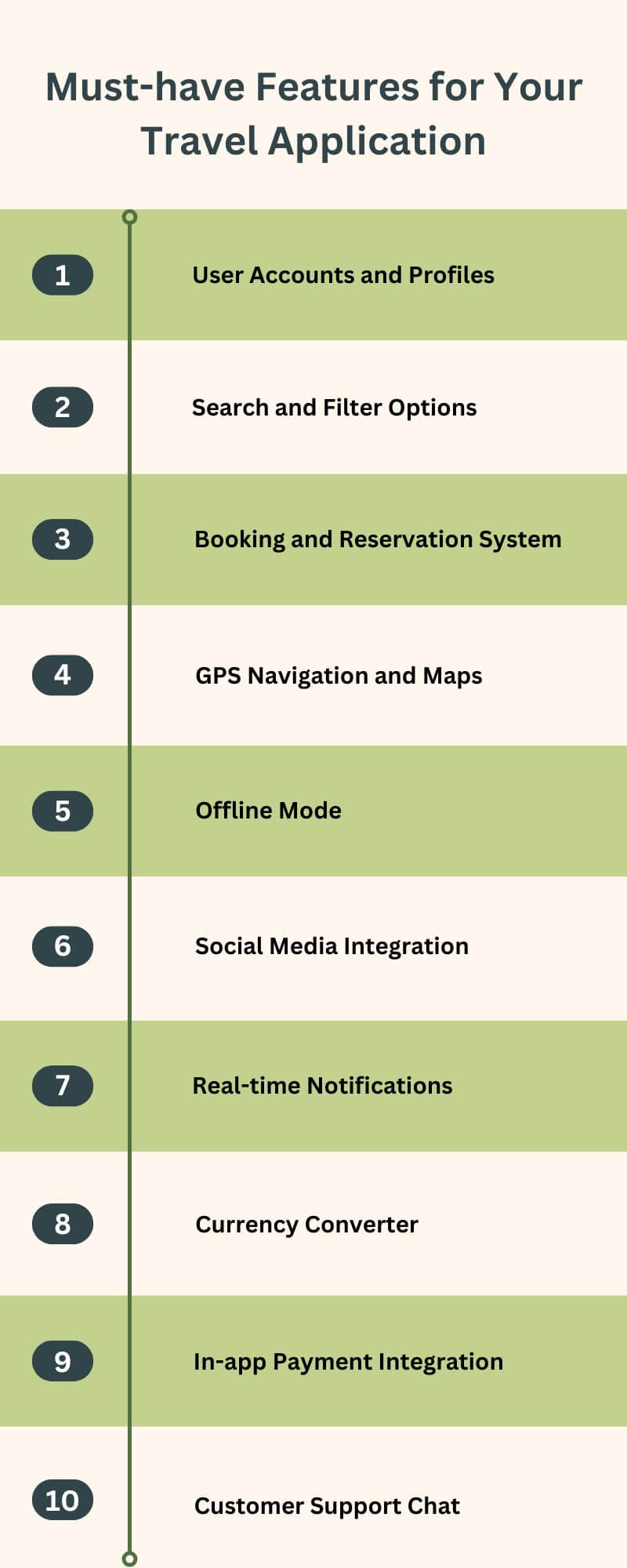Table of Contents
The travel industry has evolved drastically from the days of paper brochures, printed maps, and manual bookings to a digital-first ecosystem. Economic growth, digitalization, intraregional cooperation, and technology are a few factors that have fueled this massive transition. And how can we forget the role of smartphones in the travel industry?
Smartphones have given travelers access to apps that help them plan their trips and deliver instant itineraries, services, bookings, etc. With travel app development, businesses can provide seamless on-demand solutions leveraging advanced technologies like AI/ML, Blockchain, and predictive analytics to meet customer’s needs quickly and efficiently.
In fact, the worldwide travel application market was valued at USD 1.27 billion in 2023 and is expected to reach USD 6.41 billion by 2032. So, travel companies have a massive opportunity to maximize ROI through value-driven mobile app development. As a leading travel and tourism app solutions provider, we have curated this guide that covers essential features, development costs, revenue models, and more.
Essential Factors to Consider While Developing a Travel App
Travel app development is only the first step in the more extensive process of creating a travel app. Before building a mobile solution, assessing your app idea and ensuring it satisfies market expectations is crucial.
Below are the steps to build a travel app that can drive value for business owners.

1. Analyze Competitors to Identify Opportunities
Analyzing your competitors can help you learn what is already available and what customers want from a travel app. This knowledge enables you to detect market gaps and develop a travel app that genuinely stands out by highlighting the advantages and disadvantages.
The first step in conducting competitor research is to begin your search with companies that provide the same services or cater to similar customer demands. Some popular travel companies you can analyze are Hopper, TripIt, Airbnb, Booking.com, etc.
After that, evaluate the software’s user-friendliness, value proposition, and popularity.
2. Choose Essential Features for Your Travel App
The next step in travel application development is to determine the most essential features necessary to satisfy the needs and preferences of the target audience that you discovered during competition research. For example, infrequent visitors may find local guides helpful, whereas regular travelers may prioritize booking options.
Several ways exist to prioritize features in travel software development. SWOT analysis is one of them. AppChopper’s professionals use it to assist clients who depend on our business analytics services in determining the most critical aspects of their solutions.
3. Partner with the Right Travel App Development Company
A reputed travel app development company with expertise and relevant industry experience could be your best option. The following steps can help you assess a travel and tourism app development agency’s capabilities.
-
Examine Their Portfolio
To ensure they comprehend your needs, look for similar projects they have previously completed.
-
Verify Customer Testimonials or References
Check how successfully they fulfill their commitments, particularly concerning budgets and timelines.
-
Interview Them
Discuss your travel app idea in detail and determine how they would go about it. This will help you evaluate their understanding and problem-solving abilities.
-
Establish a Precise Contract
Set realistic deadlines to stay on course. Remember to sign an NDA to safeguard your intellectual property.
4. Define Goals in the Discovery Phase
In this phase, your tourism app development team works closely with you to comprehend your vision and goals and describe the app’s principal functions, aesthetics, and user experience.
They ensure that everything is according to users’ needs, which will help you prevent costly mistakes later on.
After the discovery phase, you will have a well-defined, documented list of the features that need to be created and a well-organized travel application development process that fits your budget and timeline.
5. Develop Your Travel Application
At this stage, the travel app’s actual coding and development begin. Travel app developers create prototypes and features using the previously established design and needs.
This entails integrating the backend (databases and servers) and the frontend (the user interface)components and extensive testing to ensure seamless operation.
We recommend building travel app MVP to reduce risks, whether you’re developing a mobile solution or a web application. An MVP is a basic version of your application with only the essential functionalities required to meet early users’ needs.
6. Test Comprehensively Before Launching
Even a minor problem can start a series of events that have severe consequences and harm the reputation of your travel app. A consistent travel app testing and QA process can prevent issues that could seriously impact the outcome.
Additionally, it makes the app dependable and prepared to wow consumers immediately. Unit testing, integration testing, usability testing, and performance testing are all part of the standard software testing lifecycle.
7. Implement Effective Marketing Strategies
Regardless of how fantastic your travel software is, people must know it before using it. Your app’s success depends on your ability to reach your target audience, create buzz, and encourage downloads. It’s wise to begin marketing even before developing the travel booking app.
Here’s a concise marketing plan outline for developing an app for the travel industry on a budget.
Pre-Development
- You should create a landing page to outline travel app features and capture early subscribers.
- Next, you can build a social media presence to engage potential users.
During Development
- Use content marketing (blogs, videos) to attract traffic.
- Collaborate with travel influencers or brands for broader reach.
- Run a beta test to gather feedback and build anticipation.
Pre-Launch
- Announce the launch via emails, social media, and countdowns.
- Encourage influencers to promote on launch day.
- Offer launch-day incentives.
Post-Launch
- Act on feedback to improve user experience.
- Continue content marketing, social engagement, and ads.
- Update the application regularly with new functionalities.
8. Provide Ongoing Support and Improvements
Changes in technology or security may cause your mobile travel app development solutions to slow down or become obsolete as they age, which could impact data integrity and user satisfaction.
To make your travel app development for startups competitive and relevant, you must ensure that the legacy app is updated frequently and tested for bugs.
Types of Travel Apps Your Business Can Create
Explore diverse travel app development solutions for business owners to capture niche markets and maximize engagement.

1. Trip Planning Apps
Trip planning app development helps users facilitate travel itineraries by organizing flights, accommodations, and activities in one interface. It makes trips more hassle-free and enjoyable.
Examples: TripIt and Google Trips
2. Flight Booking Apps
The flight booking app development allows users to search, compare, and book flights easily. It offers flexible pricing, real-time updates, and deal alerts that increase customer satisfaction.
Examples: Skyscanner, Hopper
3. Hotel Booking Apps
With hotel booking app development, you can provide your users with effective hotel searches, comparisons, and personalized recommendations for quick bookings that fit their budgets.
Examples: Booking.com, Agoda
4. Accommodation Apps
Accommodation apps usually list unique lodging options like homes and rentals. They support on-demand app development and flexibility for every type of traveler.
Examples: Airbnb, Vrbo
5. Transportation Apps
These apps offer seamless access to car rentals, public transit schedules, and ride-hailing services, adding convenience for on-the-go travelers.
Examples: Uber, Lyft
6. Navigation Apps
They provide real-time maps, traffic updates, and route suggestions to make travel efficient and safe in unfamiliar areas.
Examples: Google Maps, Waze
7. Cruise Booking Apps
These apps allow users to explore and book cruises, access itineraries, and manage bookings, making cruise planning easier.
Examples: Cruise.com, Carnival
8. Travel Expense Management Apps
You can hire a custom travel app development services provider to create a travel app that manages budgets, tracks expenses, and splits costs. These apps support financial control and transparency during trips.
Examples: Expensify, Splitwise
Key Tech Stack for Travel Application Development
Selecting the right tech stack is essential for travel app development. You must choose between cross-platform app development or building a Native app for iOS and Android.
There is no one-size-fits-all tech stack. It depends on how you want your travel app to perform. Here is a breakdown of crucial technologies for building travel applications.
| Tech Stack Component | Technologies | Purpose |
| Programming Languages | Swift, Kotlin, JavaScript | Core development for iOS, Android, and web apps |
| Front-End Frameworks | React Native, Flutter, Angular | Enables responsive and cross-platform UI |
| Back-End Frameworks | Node.js, Django, Ruby on Rails | Manages app logic and API integration |
| Databases | MySQL, PostgreSQL, MongoDB | Stores user data, bookings, preferences |
| Cloud Services | AWS, Google Cloud, Microsoft Azure | Supports storage, hosting, and scalable architecture |
| Payment Gateways | Stripe, PayPal, Braintree | Facilitates secure in-app payments |
| Location & Mapping | Google Maps API, Mapbox | Provides real-time maps & location-based services |
| Push Notifications | Firebase Cloud Messaging, OneSignal | Offers users with alerts and updates |
| Analytics & Tracking | Google Analytics, Mixpanel | Tracks user behavior for insights and improvements |
| Security Tools | SSL, OAuth, Firebase Authentication | Ensures data privacy and secure access |
15 Must-have Features to Include in Travel App Development
These features for travel app development help improve user experience, drive engagement, and support seamless functionality. Moreover, it empowers business owners to provide an exceptional digital travel experience.

-
User Accounts and Profiles
This feature helps users create personalized accounts to save preferences, bookings, and itineraries. It also enables quick login and secure data storage.
-
Search and Filter Options
You can provide users with advanced search and filter capabilities to refine their results based on location, price, ratings, or amenities. It makes it easy for users to find what they need hassle-free.
-
Booking and Reservation System
Smart travel app solutions must integrate a system for users to book flights, accommodations, and activities directly from the app and support easy cancellation or modification.
-
Loyalty Program or Rewards System
Engage users with points, rewards, or discounts so that they can use the app repeatedly. This helps boost customer retention and encourage app loyalty.
-
GPS Navigation and Maps
Developing a GPS-based travel app helps travelers navigate with integrated maps, location tracking, and route planning. It ensures ease in reaching destinations or exploring nearby attractions.
-
Reviews and Ratings
This feature lets users leave and view flight, hotel, and activity ratings. It builds trust and helps others make informed choices.
-
Offline Mode
One of the significant benefits of travel apps is that they allow access to essential information like itineraries or maps without an internet connection. This makes them convenient in areas with poor connectivity.
-
Social Media Integration
It facilitates the easy sharing of experiences, check-ins, or photos, which enhances engagement and app visibility on popular social platforms.
-
Real-time Notifications
Features of a successful travel app also include real-time notifications. These provide users timely updates on bookings, travel schedules, weather, and promotions.
-
Weather Updates
Travel app owners can also provide current and forecasted weather information for destinations. It helps users plan better and adjust activities as needed.
-
Safety and Emergency Features
To ensure user safety during travel, you can provide quick access to local emergency contacts, safety tips, and health facilities within the app.
-
Multilingual Support
Provide multi-language support in travel apps to accommodate users from diverse regions, making the app accessible and user-friendly for international travelers.
-
Currency Converter
Integrating APIs in travel apps like currency converters helps travelers efficiently manage expenses by checking real-time exchange rates.
-
In-app Payment Integration
Mobile payment integration in travel apps offers secure processing for bookings and services, simplifies transactions, and enhances trust.
-
Customer Support Chat
This feature provides 24/7 in-app support to resolve customer queries quickly. It offers a positive user experience and reduces potential travel issues.
Emerging Travel App Trends That are Revolutionizing the Industry
Discover emerging trends in travel app development that leverage advanced technology to improve user experience and create new business opportunities.
1. AI-Powered Personalization
AI in travel app development can provide recommendations based on user preferences and past behaviors. This helps enhance engagement with personalized itineraries and content.
2. Voice Assistants and Chatbots
You can build a travel planner app with AI chatbots and voice assistants, which provide instant assistance, booking management, and 24/7 customer support.
3. Augmented Reality (AR) Experiences
AR offers immersive navigation and virtual previews of destinations or accommodations, adding a fun, engaging layer to the travel experience.
4. Blockchain for Secure Transactions
Blockchain records transactions on a decentralized, immutable ledger, which can be used to make transparent, secure payments and reduce fraud.
5. Virtual Tours and Experiences
Augmented Reality (AR) in travel apps offers virtual tours to help users explore destinations, hotels, or experiences remotely. It assists in making informed travel plans.
6. Geo-Targeting and Location-Based Services
Location-based services in travel apps use data to provide nearby recommendations, enhance travel spontaneity, and help users discover local attractions or deals.
How Can Travel Applications Generate Revenue?
Explore various travel app monetization strategies that allow your applications to generate revenue while providing valuable services.
-
Advertising
Integrate in-app ads from travel-related brands or services. This allows you to earn revenue from ad impressions or clicks without charging users directly for app access.
-
Commission on Bookings
Earn a commission from third-party bookings for flights, hotels, or restaurant reservations through end-to-end travel app development.
-
Subscription Model
Offer premium features, exclusive deals, or ad-free access via a subscription, encouraging loyal users to pay regularly for enhanced experiences.
-
Freemium Model
Provide essential features for free and charge for advanced options. It allows users to experience the app before deciding to upgrade.
-
In-app purchases
Sell items like travel guides, virtual tours, or premium services within the app. This provides users with extra convenience and revenue opportunities.
How Much Does Travel Mobile App Development Cost?
Travel app development costs range from $30,000 to $100,000 or more. It varies widely depending on app complexity, platform choice, and developer location. Understanding the cost of travel app development helps you budget effectively for a robust app that meets user expectations. Moreover, there are additional costs to maintain an app that can reach as high as 50% of the total development.
| Region | Hourly Rate for Developers |
| North America | $100 — $130 |
| Western Europe | $70 — $120 |
| Eastern Europe | $30 — $60 |
| Asia (India, China) | $20 — $40 |
| Latin America | $30 — $55 |
How AppsChopper Can Help You Build a Successful Travel App Solution?
To create a successful travel application, you must select the appropriate tech stack and monetization strategy while prioritizing security, customization, and user experience. Another way to distinguish yourself is to stay ahead of industry trends like social connection, AR/VR, and sustainability.
AppsChopper provides custom app development to realize your ideas, whether you want to revolutionize transport or create a unique travel app. Contact us to discuss your idea.
Frequently Asked Questions
Why should I invest in developing a travel app for my business?
Investing in travel app development increases customer engagement and streamlines business operations and bookings. Moreover, it can help you improve brand visibility, reach a wider audience, and offer valuable insights for informed decision-making.
How much does it cost to develop a travel app?
The cost to build a travel app varies depending on its complexity, features, and platform. However, full-scale app development typically ranges from $30,000 to $100,000 or more.
What are the benefits of integrating GPS and real-time data in a travel app?
Real-time data and GPS integration for travel apps enhance user experience by providing accurate location-based services, navigation, and timely updates. Additionally, it boosts engagement and user satisfaction.
What technologies are used in travel app development?
Travel app development companies use popular technologies for real-time data, such as native programming languages (Swift, Kotlin), cross-platform frameworks (React Native, Flutter), cloud services (AWS, Google Cloud), and APIs for result-driven solutions.








